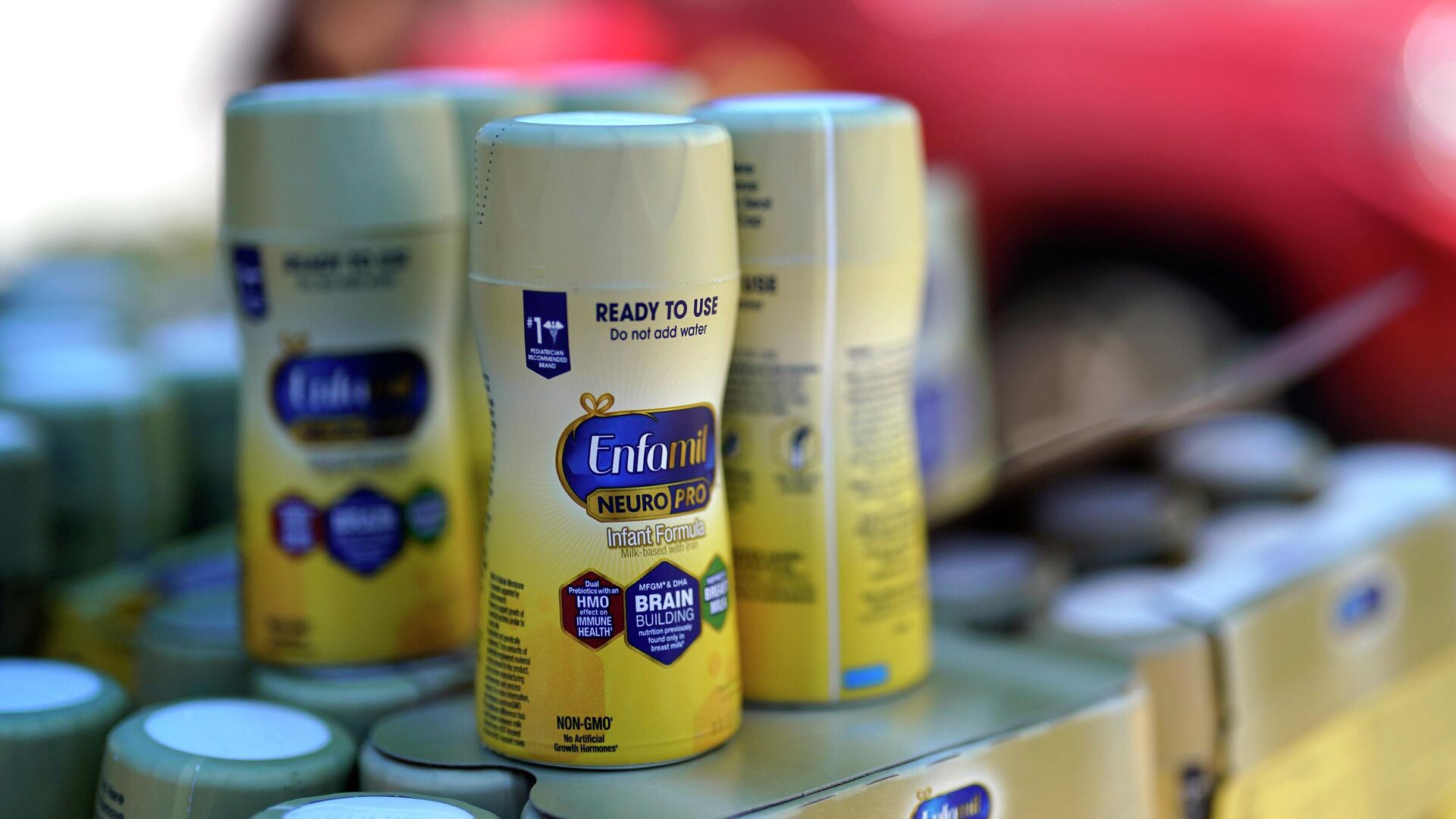https://sputnikglobe.com/20220520/abbott-prioritized-enriching-stockholders-over-formula-safety---report-1095671428.html
Abbott Prioritized Enriching Stockholders Over Formula Safety - Report
Abbott Prioritized Enriching Stockholders Over Formula Safety - Report
Sputnik International
In February, the FDA and Abbott Nutrition recalled a batch of baby formula linked to illness and possible death in some infants. While Abbott has denied their... 20.05.2022, Sputnik International
2022-05-20T19:02+0000
2022-05-20T19:02+0000
2022-05-20T19:02+0000
abbott laboratories
baby formula
ron wyden
https://cdn1.img.sputnikglobe.com/img/07e6/05/10/1095552930_0:320:3073:2048_1920x0_80_0_0_f7ce75470f2b69020477c50bdcf38c6b.jpg
Baby formula company Abbott ignored warnings about deteriorating equipment and detected bacteria in formula eight times between 2019 and 2021 while their profits soared 94%, according to The Guardian.During that same time period, Abbott also increased their stockholder dividends by over 25% and announced a stock buyback program costing $5 billion.While Abbott denies that the stock buyback hurt their product safety, the tainted baby formula led to a February recall and according to the FDA and CDC may have led to the deaths of two infants and caused at least another four babies to become ill.The babies were infected with Chronobacter sakazakii, a bacteria that thrives in dry places, such as powdered baby formula.Abbott, who is responsible for 43% of all baby formula created in the United States, has denied responsibility for the infant deaths, stating “there is no evidence to link our formulas to these infant illnesses.”A federal whistleblower complaint, sent to the FDA in October months before the outbreak, alleged that plant officials at the Sturgis factory knowingly falsified records on numerous occasions, and had issues sealing cans of formula. The complaint also alleges that after the formula was found to contain unspecified microorganisms, the company only destroyed part of the batch it felt was the most contaminated and then neglected to test the remaining product, sending it to store shelves instead.Also according to the complaint, several product flow pipes were “pitting” resulting in tiny pinholes that could have allowed bacteria to enter the system and prevent proper cleaning of equipment.Pitting is a term used to describe when pipes begin to corrode from the inside, eventually creating small holes and leaking. While the damage may appear minor, it is usually indicative of larger damage. The pinholes are comparable to the tips of an iceberg, with something much larger looming just under the surface.Responding to reports of the whistleblower, Abbott claims he was “dismissed due to serious violations of Abbott’s food safety policies.”Meanwhile, Senator Ron Wyden of Oregon, who is the Senate Finance committee chair, has requested information about Abbott’s stock buyback plan. Stock buybacks were illegal because they were seen as a tool for market manipulation, until 1982.To address the shortage caused by the Abbott recall, President Biden has invoked the defense production act to increase production and the FDA has indicated that it may temporarily allow the importation of baby formula from overseas. Currently, 98% of baby formula on American shelves is domestically produced.
Sputnik International
feedback@sputniknews.com
+74956456601
MIA „Rossiya Segodnya“
2022
News
en_EN
Sputnik International
feedback@sputniknews.com
+74956456601
MIA „Rossiya Segodnya“
Sputnik International
feedback@sputniknews.com
+74956456601
MIA „Rossiya Segodnya“
abbott laboratories, baby formula, ron wyden
abbott laboratories, baby formula, ron wyden
Abbott Prioritized Enriching Stockholders Over Formula Safety - Report
In February, the FDA and Abbott Nutrition recalled a batch of baby formula linked to illness and possible death in some infants. While Abbott has denied their formula was the cause, it shut down its Sturgis, Michigan plant, resulting in nationwide shortages.
Baby formula company Abbott ignored warnings about deteriorating equipment and detected bacteria in formula eight times between 2019 and 2021 while their profits soared 94%,
according to The Guardian.
During that same time period, Abbott also increased their stockholder dividends by over 25% and announced a stock buyback program costing $5 billion.
While Abbott denies that the stock buyback hurt their product safety, the tainted baby formula led to a February recall and according to the FDA and CDC may have led to the deaths of two infants and caused at least another four babies to become ill.
The babies
were infected with Chronobacter sakazakii, a bacteria that thrives in dry places, such as powdered baby formula.
Abbott, who is responsible for 43% of all baby formula created in the United States, has denied responsibility for the infant deaths, stating “there is no evidence to link our formulas to these infant illnesses.”
A federal whistleblower complaint, sent
to the FDA in October months before the outbreak, alleged that plant officials at the Sturgis factory knowingly falsified records on numerous occasions, and had issues sealing cans of formula. The complaint also alleges that after the formula was found to contain unspecified microorganisms, the company only destroyed part of the batch it felt was the most contaminated and then neglected to test the remaining product, sending it to store shelves instead.
Also according to the complaint, several product flow pipes were “pitting” resulting in tiny pinholes that could have allowed bacteria to enter the system and prevent proper cleaning of equipment.
Pitting is a term used to describe when pipes begin to corrode from the inside, eventually creating small holes and leaking. While the damage may appear minor, it is usually indicative of larger damage. The pinholes are comparable to the tips of an iceberg, with something much larger looming just under the surface.
Responding to reports of the whistleblower, Abbott claims he was “dismissed due to serious violations of Abbott’s food safety policies.”
Meanwhile, Senator Ron Wyden of Oregon, who is the Senate Finance committee chair, has requested information about Abbott’s stock buyback plan. Stock buybacks were illegal because they were seen as a tool for market manipulation, until 1982.
To address the shortage caused by the Abbott recall, President Biden has invoked the defense production act to increase production and the FDA has indicated that it may temporarily allow the importation of baby formula from overseas. Currently, 98% of baby formula on American shelves is domestically produced.

